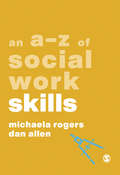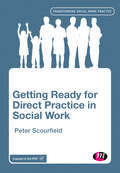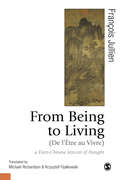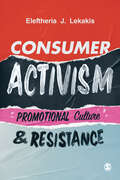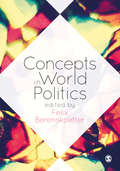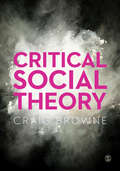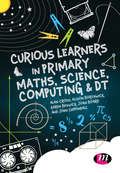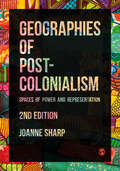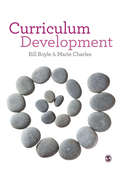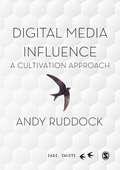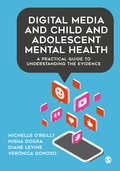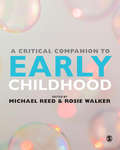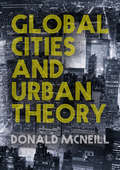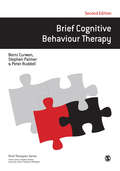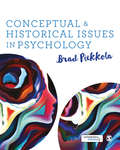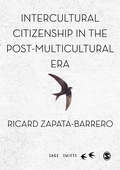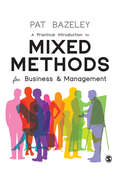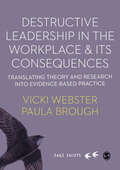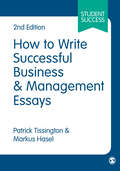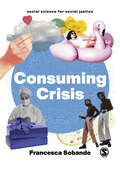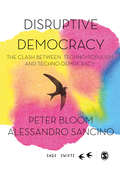- Table View
- List View
An A-Z of Social Work Skills (A-Zs in Social Work Series)
by Michaela Rogers Dan AllenPuzzled by terminology, skills, law, or theory? Revising for your placement or exam? Then look no further! This series of concise and easy-to-use A-Zs will be your guide. Designed for both students and newly-qualified social workers, this book will introduce you to over 60 key skills in a concise and no-nonsense way. You can test your knowledge and how to apply each skill in practice with Skills in Action, Stop-Reflect and Top Tips boxes.
Getting Ready for Direct Practice in Social Work (Transforming Social Work Practice Series)
by Peter ScourfieldThis very practical book will support students to meet the requirements of the compulsory Readiness for Direct Practice assessment. Useful for social work students and lecturers alike, it takes each of the 9 domains that students are tested on, breaks them down step-by step and provides a range of interactive activities that enable them to acquire the knowledge, values and skills for practice required at this level. It offers students a foundation to the key areas of knowledge for each of the 9 domains, while also signposting them to other popular books in the Transforming Social Work Practice series for a more detailed discussion as well.
From Being to Living : a Euro-Chinese lexicon of thought (Published in association with Theory, Culture & Society)
by François Jullien Michael Richardson Krzysztof FijalkowskiThis new English translation of François Jullien’s work is a compelling summation of his thinking on the comparison between Western and Chinese thought. The title, From Being to Living, summarises his essential point: that western thinking is obsessed by – and determined as well as limited by – the notion of Being, whereas traditional Chinese thought was always situated in Living. Organized as a lexicon around some 20 concepts that juxtapose Chinese and Western thought, Jullien explores the ways the two have historically evolved, and how many aspects of Chinese thought developed in complete isolation from the West, revealing a different way of relating to the world. Translated by Michael Richardson and Krzysztof Fijalkowski, this text explores Chinese thinking and language in order to excavate elements from them that reveal the fault lines of western thinking. This is an important book for students, scholars and practitioners alike across the Social Sciences.
Consumer Activism: Promotional Culture and Resistance
by Eleftheria J Lekakis"A crucial intervention to both critical studies of consumption and research into activism. It authoritatively explores the complex and multiplying links between branding and neoliberal culture, consumer practices and social justice." – Professor Mehita Iqani, Stellenbosch University "Eleftheria Lekakis reminds us that as consumers, we can do much more than just buy our way out of social or political problems." – Professor Melissa Aronczyk, Rutgers University Consumption and resistance are entwined. From buying fair-trade, to celebrity advocates for social causes, to subvertising and anti-consumerist grassroots movements, consumer activism is now a key part of our fight for social and environmental justice. This book is a comprehensive exploration of the complexities and dilemmas of using the marketplace as an arena for politics. It goes beyond simply buying or boycotting to critically explore how individuals, collectives, corporations and governments do politics with and through consumption. Impassioned and always accessible, Eleftheria Lekakis explores: The media and economic logics which privilege elite activists. The real opportunities to resist and redirect promotional culture. Consumer activism as collective and community-building. The politicisation of celebrity influencers. The centrality of digital media technology. A range of transnational case studies pushing the field beyond the Global North. Consumer Activism: Promotional Culture and Resistance covers the full breadth of theory and practice you need to know. It is an essential resource for understanding, researching and engaging with the global phenomenon of consumer activism. Dr Eleftheria Lekakis is senior lecturer in Media and Communications at the School of Media, Arts, and Humanities at the University of Sussex.
Concepts in World Politics
by Felix BerenskoetterRecognizing the vital importance of concepts in shaping our understanding of international relations, this ground-breaking new book puts concepts front and centre, systematically unpacking them in a clear, critical and engaging way. With contributions from some of the foremost authorities in the field, Concepts in World Politics explores 17 core concepts, from democracy to globalization, sovereignty to revolution, and covers: The multiple meanings of a concept, where these meanings come from, and how they are employed theoretically and practically The consequences of using concepts to frame the world in one way or another The method of concept analysis A challenging and stimulating read, Concepts in World Politics is an indispensable guide for all students of international relations looking to develop a more nuanced and sophisticated understanding of world politics.
Aesthetic Labour
by Dennis Nickson Chris WarhurstThis accessible and exciting new text looks at the implications of aesthetic labour for work and employment by contextualizing debates and offering a critical approach. The origins of aesthetic labour are explored, as well as the relevant theories from business and management, and sociology. Coverage includes key topics such as: corporate strategy; recruitment and selection practices; and discrimination. Key features include: - a range of case studies from across different types of organizations and popular culture - the exploration of topics such as branding, ′lookism′, ′dressing for success′ and cosmetic surgery - suggestions for further reading.
Critical Social Theory
by Craig BrowneIn this accomplished, sophisticated and up-to-date account of the state of critical social theory today, Craig Browne explores the key concepts in critical theory (like critique, ideology, and alienation), and crucially, goes on to relate them to major contemporary developments such as globalization, social conflict and neo-liberal capitalism. Critical theory here is not solely the work of Adorno, Horkheimer, Marcuse and Habermas. The book begins with the Frankfurt School but uses this as a base to then explore more contemporary figures such as: Nancy Fraser Axel Honneth Luc Boltanski Cornelius Castoriadis Ulrich Beck Anthony Giddens Pierre Bourdieu Hannah Arendt A survey of critical social theory for our times, this is an essential guide for students wishing to grasp a critical understanding of social theory in the modern world.
Curious Learners in Primary Maths, Science, Computing and DT
by Alan Cross Jon Board Jon Chippindall Karen Beswick Alison BorthwickWhether it is in the National Curriculum or the Teachers′ Standards, promotion of children′s curiosity is highlighted as a key part of effective teaching. Curiosity has the potential to enhance learning in all curriculum subjects but it has a special connection with scientific thinking. A curious approach can open up learning in science, computing, design technology and mathematics. This text explores how teachers can harness the power of curiosity in their classroom. Full of practical teaching ideas for engaging learners and making lessons more exciting, it highlights the ways in which STEM subjects can be taught together. Coverage includes: the place of curiosity in subject teaching how curiosity contributes to a learner′s overall capability examples of curiosity in primary STEM classes case studies which exemplify curiosity.
Geographies of Postcolonialism: Spaces of Power and Representation
by Joanne P SharpExtensively revised, the second edition of Geographies of Postcolonialism introduces the principal themes and theories related to postcolonialism. Written from a geographical perspective, the text includes extended explanations of the cultural and material spaces of the colonial and postcolonial power and representation. Exploring postcolonialism through the geographies of imagination, knowledge and power, the text analyses the history of western representations of the "Other" and engages with the important conceptual contributions of postcolonial theory. Comprehensive, accessible and illustrated with learning features throughout, Geographies of Postcolonialism will be the key resource for students interested in the geographical and spatial dimensions of colonialism and postcolonialism. Jo Sharp is Professor of Geography at the University of St Andrews in Scotland.
Curriculum Development: A Guide for Educators
by Marie Charles Bill BoyleCurriculum and curriculum issues are at the heart of current debates about schooling, pedagogy and learning. This book will enable practitioners, scholars and academics to understand how to re-design or to suggest changes to curriculum structure, shape and content. Grounded in theory and philosophy, the book also offers practical help in grasping this controversial area. Inside, the authors: provide practical planning templates support and provoke analysis, discussion and experimentation include definitions of key terms and reflective questions incorporate practical examples and case material based on their work worldwide on curriculum design and evaluation.
Digital Media Influence: A Cultivation Approach (SAGE Swifts)
by Andy RuddockPopulism, misogyny, rampage murders. Digital media seem to lie at the heart of sinister, intractable social challenges. Curiously, the very societies who fear such things are often dismissive of media research. Addressing key issues affecting global media industries, this book explains how to solve the present conundrum by appreciating the historical development of cultivation theory. Digital Media Influence ties cultivation themes, such as mean world syndrome, mainstreaming, the celebration of white male violence, the ridiculing of ageing women, the inhibition of activism, the mediatisation of religion and the erosion of trust in education, with contemporary digital media case studies. Considering the aftermath of the Parkland murders, political memes, Islamophobia, the fate of female reality TV stars and the bad press directed at media education, Ruddock shows how these phenomena are born of media practices that cultivation theory began to dissect in the 1950s. Paying close attention to the life and work of George Gerbner, Digital Media Influence locates today’s questions in the historical forces and relationships that moved media industries closer to the heart of global politics in the mid-20th century. It makes Gerbner’s work relevant to all critical media researchers by providing a theoretical, methodological and historical steer for understanding new media influences. In explaining how one of the world’s leading media theories developed in relation to intriguing historical circumstances – many of them deeply personal – this book helps researchers of all levels to find their voice in writing on media issues.
Geographies of Postcolonialism: Spaces of Power and Representation
by Joanne P SharpExtensively revised, the second edition of Geographies of Postcolonialism introduces the principal themes and theories related to postcolonialism. Written from a geographical perspective, the text includes extended explanations of the cultural and material spaces of the colonial and postcolonial power and representation. Exploring postcolonialism through the geographies of imagination, knowledge and power, the text analyses the history of western representations of the "Other" and engages with the important conceptual contributions of postcolonial theory. Comprehensive, accessible and illustrated with learning features throughout, Geographies of Postcolonialism will be the key resource for students interested in the geographical and spatial dimensions of colonialism and postcolonialism. Jo Sharp is Professor of Geography at the University of St Andrews in Scotland.
Digital Media and Child and Adolescent Mental Health: A Practical Guide to Understanding the Evidence
by Nisha Dogra Michelle O′Reilly Diane Levine Verónica DonosoCan moderated screen time actually have a positive impact on young people’s mental health? With over 30 expert contributors spanning a range of disciplines including psychology, education and communications, as well as young people′s own perspectives, this book dispels some of the myths that surround young people’s use of digital media and covers important topics ranging from safeguarding, to digital citizenship and the fear of missing out. Using reflective activities, practical tips and evidence-based research, this book will help you find out informed ways social and digital media can be used beneficially, providing vital understanding to anyone studying child and adolescent mental health.
A Critical Companion to Early Childhood
by Michael Reed Rosie WalkerIn this stimulating and provocative book the editors have drawn together a diverse and international range of respected authors, each of whom has taken a critical approach to the contentious question of how you define and achieve quality early childhood services. It is a book designed to provoke and promote critical dialogue and discourse amongst practitioners and students through critical engagement with the position of the authors within the text. I believe anyone who reads this book will be inspired and motivated to challenge and extend their thinking and professional practice, adopting the critical stance which lies at the heart of quality services for children and families. Professor Chris Pascal, Director of Centre for Research in Early Childhood (CREC) Early childhood is a complex and important area of study where it is important to develop your critical thinking and reflect upon key issues. This book will help do both. It explores interrelated topics such as: Child development Play Safeguarding Professionalism Curriculum and Policy Each chapter will not only engage with what you need to know but help you develop your academic skills. The book also comes with lots of online resources and include: Podcasts from the authors of each chapter so you can better understand the key concepts PowerPoints to help you revise the essential information Journal articles related to each chapter provide further reading Michael Reed and Rosie Walker are both Senior Lecturers in Early Childhood at the Institute of Education, University of Worcester.
Global Cities and Urban Theory
by Donald McNeillGlobal Cities and Urban Theory provides an innovative set of approaches to understanding some of the world′s major cities, working with concepts such as smart cities, volumetric urbanism, and critical accounting to illustrate the everyday agents and practices that place cities in the world. Donald McNeill draws on detailed discussions of major cities such as London, San Francisco, Paris and Singapore to provide a deep understanding of how urban theory can be grounded in the cultural economies of urban development. The book: Reviews the insights of key thinkers such as Bruno Latour, Mike Davis, and Jane M. Jacobs in relation to specific cities. Highlights methodological and epistemological notes on each theme. Provides case studies of nine key global cities, examined in the context of specific material and spatial practices. Essential reading for upper level students and researchers across urban studies, urban geography, urban sociology and urban policy.
Brief Cognitive Behaviour Therapy (Brief Therapies series)
by Stephen Palmer Berni Curwen Peter RuddellThis timely new edition describes how to use cognitive behaviour therapy successfully with clients in a brief, time-limited way. After reading this book therapists will be able to provide effective help to clients suffering from a wide range of disorders, including anxiety, depression, obsessive-compulsive disorder and post-traumatic stress, or those who are suicidal. Following an explanation of brief therapy and the theory behind cognitive behaviour therapy, the authors outline strategies for helping clients overcome unhelpful beliefs and thought patterns through all stages of counselling. Using illustrative case material throughout, the updated book includes: extra practical material for the client and therapist to use during the counselling process a brand new chapter on brief CBT in groupwork expansion of discussion on counselling suicidal clients within a brief CBT framework. Every trainee psychotherapist should own a copy of this book, and it is important reading for all new health professionals working in the NHS and private practice.
Digital Media Influence: A Cultivation Approach (SAGE Swifts)
by Andy RuddockPopulism, misogyny, rampage murders. Digital media seem to lie at the heart of sinister, intractable social challenges. Curiously, the very societies who fear such things are often dismissive of media research. Addressing key issues affecting global media industries, this book explains how to solve the present conundrum by appreciating the historical development of cultivation theory. Digital Media Influence ties cultivation themes, such as mean world syndrome, mainstreaming, the celebration of white male violence, the ridiculing of ageing women, the inhibition of activism, the mediatisation of religion and the erosion of trust in education, with contemporary digital media case studies. Considering the aftermath of the Parkland murders, political memes, Islamophobia, the fate of female reality TV stars and the bad press directed at media education, Ruddock shows how these phenomena are born of media practices that cultivation theory began to dissect in the 1950s. Paying close attention to the life and work of George Gerbner, Digital Media Influence locates today’s questions in the historical forces and relationships that moved media industries closer to the heart of global politics in the mid-20th century. It makes Gerbner’s work relevant to all critical media researchers by providing a theoretical, methodological and historical steer for understanding new media influences. In explaining how one of the world’s leading media theories developed in relation to intriguing historical circumstances – many of them deeply personal – this book helps researchers of all levels to find their voice in writing on media issues.
Conceptual and Historical Issues in Psychology
by Brad PiekkolaThis book covers key movements that helped to shape psychology – from the early philosophical debate between rationalism and empiricism or realists and antirealists through to the emergence of psychology as a science and the ongoing debates about ‘objectivity’ and ‘truth’ and what a science of psychology should be. Often nuanced and complex, the author examines major conceptual issues in the history of psychology that continue to be debated and influence public policy and lay understanding. The latter stages of the book explore notions of individuality, hereditarianism, critical psychology, and feminist perspectives. While deeply rooted in human history, it is made clear that psychology, how it is conceived and practiced, has a bearing on our understanding of what it is to be human. Accessible, objective and above all comprehensive, this book will help students locate psychology in the wider field of science and understand the forces that continue to shape and define it.
Intercultural Citizenship in the Post-Multicultural Era (SAGE Swifts)
by Ricard Zapata-BarreroThis book explores the intercultural policy paradigm emerging within diversity and migration studies. Drawing on empirical studies of cultural diversity and placing a focus on the current crises of identity in Europe, Zapata-Barrero argues for an intercultural model of citizenship that prioritises contact between diverse people. In looking forward to a post-multicultural era, his analysis suggests how we can better manage the challenges presented by our increasingly complex, multifaceted societies. This thoughtful text will appeal to students and scholars across politics, sociology, anthropology and social psychology, as well as policy makers and social entrepreneurs around the world grappling with issues around migration, diversity and citizenship. Ricard Zapata-Barrero is a Full Professor of Political and Social Sciences at the Universitat Pompeu Fabra (Barcelona, Catalonia, Spain). He is also Director of the Interdisciplinary Research Group on Immigration at UPF, and Master in Migration Studies. He is member of the Board of Directors for IMISCOE and Chair of the External Affairs Committee. For information about publications, go to his webpage: www.upf.edu/web/ricard-zapata
A Practical Introduction to Mixed Methods for Business and Management
by Pat BazeleyMixed Methods Research for Business and Management guides students and researchers through how to use this methodology successfully in a research-based dissertation or project. The book introduces the concepts and debates associated with combining methods, and illustrates the many benefits, and hazards, of undertaking a mixed methods study. Example studies from across business and management disciplines bring the text to life throughout. The reader is taken step-by-step through the mixed methods process from developing a mixed methods study, through designing and conducting it, and finally, reporting on the results. Suitable for business and management students and researchers undertaking their own mixed methods research.
Destructive Leadership in the Workplace and its Consequences: Translating theory and research into evidence-based practice (SAGE Swifts)
by Paula brough Vicki WebsterWith relevance across public, private and not-for-profit sectors, and combining perspectives from both the business and psychology worlds, this book is a cross-disciplinary look at how destructive leaders can impact organisations and their workers, and how best to recognise and deal with them. This text bridges the gap between the theory and the practical application, by taking the academic research and translating this for students, managers and practitioners in the field into practicable interventions they can use in their everyday practice to recognise and resolve issues raised by destructive leaders. Using case studies throughout, this guide takes the theory and places it in the real world, helping readers take the theory beyond the page and apply it to their practice.
How to Write Successful Business and Management Essays (Student Success)
by Patrick Tissington Markus HaselA systematic guide to successfully producing written work for business and management degrees. The authors address the all-too-common pitfalls of essay assignments, as well as providing readers with a step-by-step programme to approach essay questions, both in coursework and exam contexts. New to the Second Edition: Relevance of writing skills to employability highlighted throughout Additional content on researching a topic New content on adapting writing for different audiences New content on academic writing tips Addition of useful websites Additional coverage of plagiarism More on critical evaluation More on changing requirements through different levels of study. Suitable for all business and management students looking to improve their essay writing skills. The Student Success series are essential guides for students of all levels. From how to think critically and write great essays to planning your dream career, the Student Success series helps you study smarter and get the best from your time at university. Visit the SAGE Study Skills hub for tips and resources for study success!
Aesthetic Labour
by Dennis Nickson Chris WarhurstThis accessible and exciting new text looks at the implications of aesthetic labour for work and employment by contextualizing debates and offering a critical approach. The origins of aesthetic labour are explored, as well as the relevant theories from business and management, and sociology. Coverage includes key topics such as: corporate strategy; recruitment and selection practices; and discrimination. Key features include: - a range of case studies from across different types of organizations and popular culture - the exploration of topics such as branding, ′lookism′, ′dressing for success′ and cosmetic surgery - suggestions for further reading.
Consuming Crisis: Commodifying Care and COVID-19 (Social Science for Social Justice)
by Francesca SobandeConsuming Crisis is a crucial account of how consumer culture capitalized on Coronavirus (COVID-19). Sobande explores how brands claim to care while they encourage people to ‘keep calm and consume’. This critical analysis of the power and politics of marketing examines an eclectic mix of campaigns, content, and experiences. Such work outlines the societal significance of fast-fashion adverts, banana bread’s pandemic ‘moment’, university social media strategies, and how digital technology mediates memories and work. Based on the belief that brands cannot be activists, Sobande creatively considers how brands construct care, camaraderie, culture, and so-called ‘normal’ life during times of crisis. Francesca Sobande is a Senior Lecturer in Digital Media Studies at Cardiff University
Disruptive Democracy: The Clash Between Techno-Populism and Techno-Democracy (SAGE Swifts)
by Peter Bloom Alessandro SancinoDo new "smart" technologies such as AI, robotics, social media, and automation threaten to disrupt our society? Or does technological innovation hold the potential to transform our democracies and civic societies, creating ones that are more egalitarian and accountable? Disruptive Democracy explores these questions and examines how technology has the power to reshape our civic participation, our economic and political governance, and our entire existence. In this innovative study, the authors use international examples such as Trump’s America, and Bolsonaro’s recent election as President of Brazil, to lead the discussion on perhaps the most profound political struggle of the 21st century, the coming clash between a progressive "Techno-democracy" and a regressive "Techno-populism".
